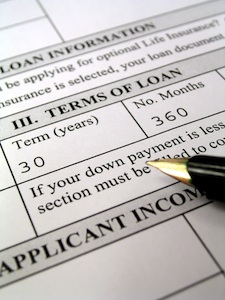If you are concerned that your home might become a foreclosure risk, you are probably casting about for other options.
Foreclosure can impact your credit score, and make it difficult for you to purchase a home in the future — at least for the next two to four years.
When you are trying to avoid foreclosure, you do have some options.
However, it’s important to realize that you will have to meet certain requirements in order to qualify for some of these options. Additionally, some of your foreclosure alternatives will impact your credit score, even if it isn’t impacted as much as it would be with a foreclosure.
Here are some of your alternatives to foreclosure:
Short Sale
This option is rising in popularity for those who have seen home values fall, and who need to move.
In a short sale, your mortgage lender agrees to let you sell your home for less than you owe on the mortgage. The mortgage lender is out the difference, but it can prevent a foreclosure process that is rarely fun for anyone.
Realize, though, that when you complete a short sale, there may be tax consequences. That amount the mortgage lender “forgives” because of the short sale might be considered income — so you could pay taxes on it.
Deed in Lieu of Foreclosure

Instead of going through the paperwork involved with foreclosure, some banks might be willing to accept the deed to your home.
You sign it over, and if your home is worth less than what you owe on the mortgage, the lender has to swallow the difference. Again, check with a knowledgeable tax professional, since there might be implications and costs associated with this option.
Realize, too, that many lenders won’t accept your short sale offer or your deed lieu offer unless your home has been on the market for at least 90 days. Due to the current economic climate and the housing market, some might be more flexible, but many lenders like to see that you at least tried to cover the mortgage amount first.
Government Programs to Help You Avoid Foreclosure
When you choose a short sale or a deed in lieu, it usually means you are moving somewhere else and need to get rid of your home. If you are trying to stay in your home as part of your attempt to avoid foreclosure, there are some government program options to consider:
- HAMP: The Home Affordable Modification Program is designed to help you refinance your home to a lower interest rate. You qualify if your mortgage is serviced by one of the participating lenders/services, and if you pay at least 31% of your pre-tax income for a mortgage payment. Your mortgage rate is dropped to 2%, and the term can be extended to up to 40 years. This can help you lower your mortgage payments to something more affordable. This program is aimed at those who are falling behind in their payments.
- HARP: Home Affordable Refinance Program is meant to help those who are up to date on their mortgage payments, but still can’t refinance because of negative equity — or not enough equity. You can qualify if your LTV (loan-to-value) is between 80% and 125%, and if you meet other requirements. The qualifications were recently loosened a bit so that more people can qualify. However, you still need a mortgage serviced by Fannie or Freddie if you want to take advantage.
- FHA Forbearance: If you are unemployed, you have the option to apply for forbearance if you have a FHA loan. This program gives you a year before your home can be foreclosed on. You can make reduced payments, or no payments, depending on what you can afford. However, you have to have been laid off and met other requirements to qualify. It’s also important to remember that forbearance is not forgiveness. This means that you will have to eventually repay what you owe due to missed principal payments and interest.
- HAFA: This is a government program related to short sales and deeds in lieu. If you meet the qualifications, you will be able to accomplish either a short sale or a deed in lieu — and be given up to $3,000 for moving expenses.
It’s also worth noting that the government recently settled with some of the biggest banks in order to provide some help for some homeowners.
The new mortgage plan allows for principal reduction for some homeowners who are underwater on their mortgages. The settlement also earmarks money for refinancing, as well as payments to victims of the practice known as robo-signing. Those with loans backed by Fannie and Freddie aren’t eligible, presumably because they have other options for government help.
If you are worried about foreclosure, you can contact your lender, or call the government’s hotline at 888-995-HOPE (4673).
Good post, Miranda.
Another thing to throw out there is that short-sales aren’t being accepted unless the borrower/home owner is behind on their payment. Of course they’ll say they are, but the reality is that they’re not being accepted.
I’ve coached a couple of people through this and I haven’t seen any lender that is willing to accept less than what you owe if you’re able to pay them their mortgage payment each month. Why would they?
Thanks for providing hope to those facing foreclosure.
ao huren hamburg is one of the most interesting places to be